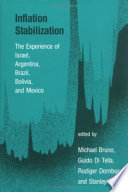
Inflation Stabilization
By - Bruno, Michael,[ED}
Floor
-
Floor 1
Published
-
MIT Press, Cambridge, Mass., ©1988
ISBN 10 - 0262022796
ISBN 13 - 9780262022798
Book Status
-
1 Qnty Available with us.
Subject
-
Economic policy
Shelf No
-
17
Call Number
-
332.4109 INF
Physical Description
-
xi, 419 pages : illustrations ; 24 cm
Notes
-
Includes Index